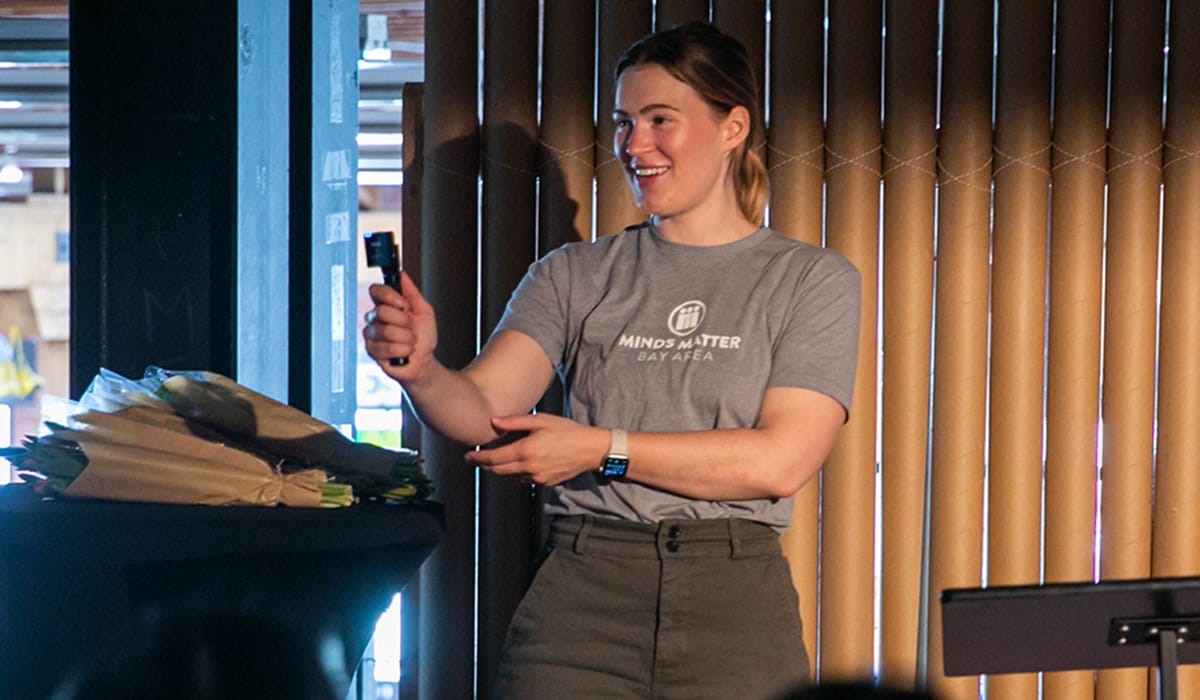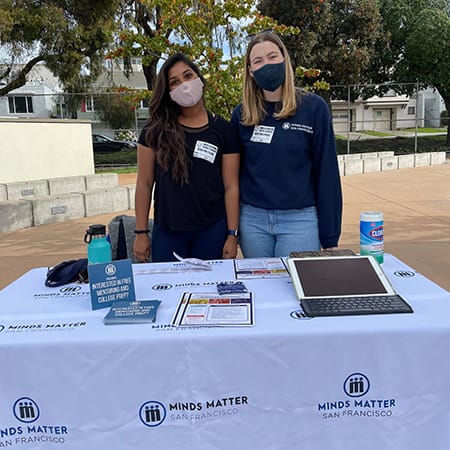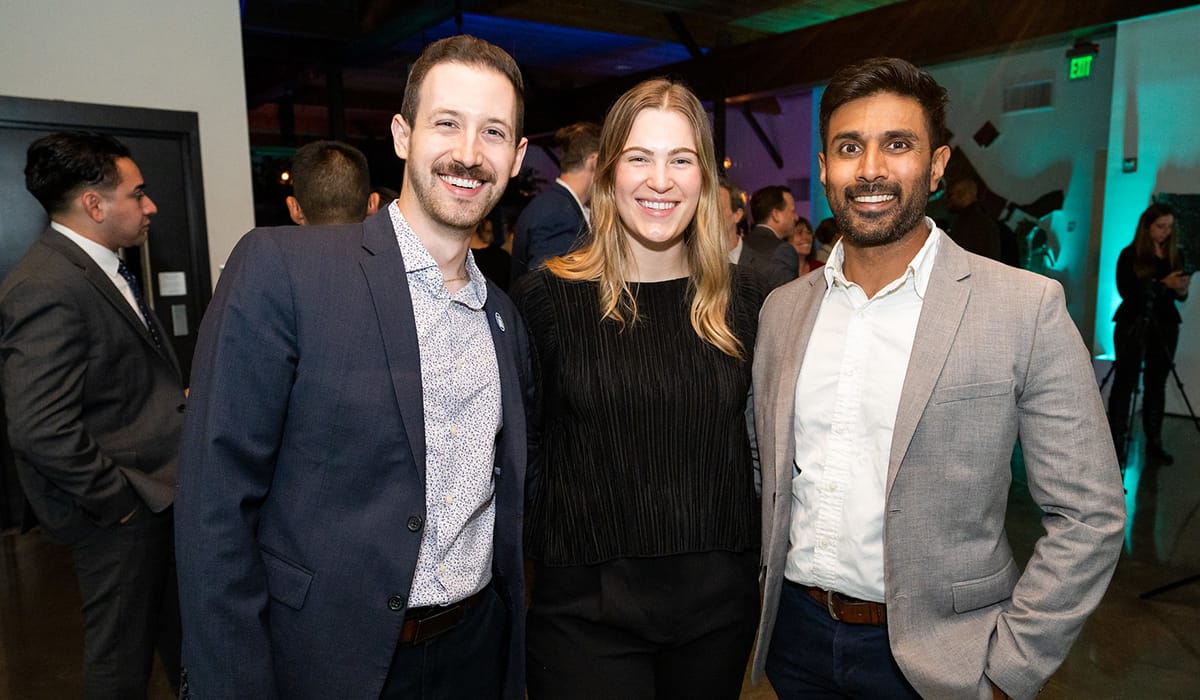Fostering Growth and Guidance Through Volunteer Leadership

Meet Daily Point of Light Award honoree Karenna Bol. Read her story, and nominate an outstanding volunteer or family as a Daily Point of Light.
Karenna Bol’s years-long tenure as the leader of the Community team at Minds Matter Bay Area (MMBay) has been marked by significant contributions to the mentorship and educational landscape. Her innovative leadership and dedicated service have significantly enhanced the experience and opportunities available to both mentees and volunteers within the community.
Recognizing the pivotal role that skilled volunteers play in the success of mentees, Karenna spearheaded a comprehensive training series aimed at enhancing the mentoring and teaching capabilities of volunteers. This program, meticulously crafted to incorporate volunteer feedback, has evolved to effectively meet the changing needs of the community it serves. Participants in the series have consistently reported that the training has been instrumental in improving their skills and perspectives, enabling them to offer more substantial support to students.
Karenna’s vision extended beyond current program participants to include the alumni of MMBay. She introduced a “mini-mentorship” program tailored to support college-going and early-career professionals. This initiative allows alumni to seek advice on a variety of critical topics – from academic choices to career development strategies.
In addition to these initiatives, Karenna has played a crucial role on the Mentee Recruiting and Alumni teams. Her efforts in recruiting have broadened the reach of MMBay’s programs, attracting a diverse range of students from across San Francisco. Through various outreach activities, including presentations at local high schools and nonprofit organizations, Karenna has spread awareness and drawn new participants into the program.
Read on to find out more about Karenna’s role and what drives her to keep advocating for this cause.

Tell us about your volunteer role.
I’ve been working with Minds Matter Bay Area for over six years now. I started wanting to get more involved in my community, being passionate about education. I started out as a tutor for SAT and ACT math. I just gradually got more involved with the program and the organization as a whole. I moved on to training our volunteers during the pandemic. Then I started as our co-chief community officer, recruiting for our volunteers and mentees. I also worked on engagement, attendance and training, which involved planning social events, as well as community engagement and recognition events.
This year I stepped back from this role, but have continued recruiting our mentees – a bit more of a “boots on the ground” team member now. Sometimes we go to schools and get the word out to students about our program. Sometimes it’s reaching out to nonprofit partners. I’m currently setting up an application workshop for students who want to apply but may be confused or intimidated. That has been really awesome.
And then I work in a couple of other capacities – one of which is with our alumni. We want to continue to provide support for them and allow them to continue to be part of our community while they’re still in college. We offer resources to them – right now we’re running a financial literacy series. We’ve done mini-mentoring with our extended network – perhaps people who aren’t full volunteers but still want to get involved. We connect them with our alumni to give them more access. With our original work with MMBay, we were looking to prepare them for and get them into college, and now we want to continue to support them while they’re in school.
Why is education so important to you?
For me, education has always been really important and so has this idea of being prepared for college; understanding not just the element of getting in – having the right grades and the right test scores – but real preparedness. I was very fortunate to not have had any question of whether I was going to go to college. But what was lacking was a mentorship element, in my own experience of college – what it really felt like to be prepared to go to one of these selective universities, how to be competitive and set yourself up well for that experience, and also to have someone to relate to.
So even more than the education part of it, and everything our organization does to help students from low-income backgrounds to bridge that generational gap and set themselves up for success, it’s really that mentorship aspect I value. For kids to have multiple people in their life, outside of their family, that they can go to and trust, who really care about them.
One of the unique parts of our program is how consistent it is. We emphasize this with volunteers as we recruit them: you’re committing to seeing the student every week. There’s not a drop-in, drop-out situation. High schoolers are not always the most enthusiastic. But it’s about putting that commitment in and showing that you’re there for them, even if you don’t get that instant gratification from them. You’re still a consistent presence in their life. When you show up week after week for them, they really start to believe in that consistency.
What’s been the most rewarding part of your work?
It’s been really rewarding to build a community within my community in San Francisco. To go really in depth with them, work with them for years and build really deep friendships. Also, feeling that sense of being part of the community with the kids as well – seeing them grow and improve. One of my first students I taught in my first year is graduating from my alma mater this coming year!
We actually have a lot of our alumni come back as mentors or volunteers later. One of the students took a tour with us a number of years ago, and I met her as a volunteer last week. That we had made enough of an impact to return as a volunteer later was so rewarding.

Why is it important for others to get involved with causes they care about?
I think the value of community cannot be understated. We often think about volunteer opportunities as feeling really good personally, to do something for others. But to really be involved in something that’s having an impact in your community, something you’re working on consistently, that’s so important in putting down roots in the community. Especially in big cities where there are lots of transplants, it pays dividends to invest in the community. The cumulative benefits over time, when you’re working consistently – it’s so gratifying.
Any advice for people who want to start volunteering?
A lot of our messaging to people who want to volunteer are that consistency and commitment are the keys. You can get gratification from doing something one time, but the amount of gratification you get from a consistent commitment is really meaningful, and that’s where you can make the most impact. Whenever you’re thinking of starting a volunteer opportunity, it’s a way to get long-term involved, not just doing something when it’s convenient for them. It doesn’t always pay off immediately. You see the benefits, or the dividends, over time.
What do you want people to learn from your story?
Just go for it! Try new things.
Do you want to make a difference in your community like Karenna? Find local volunteer opportunities.
